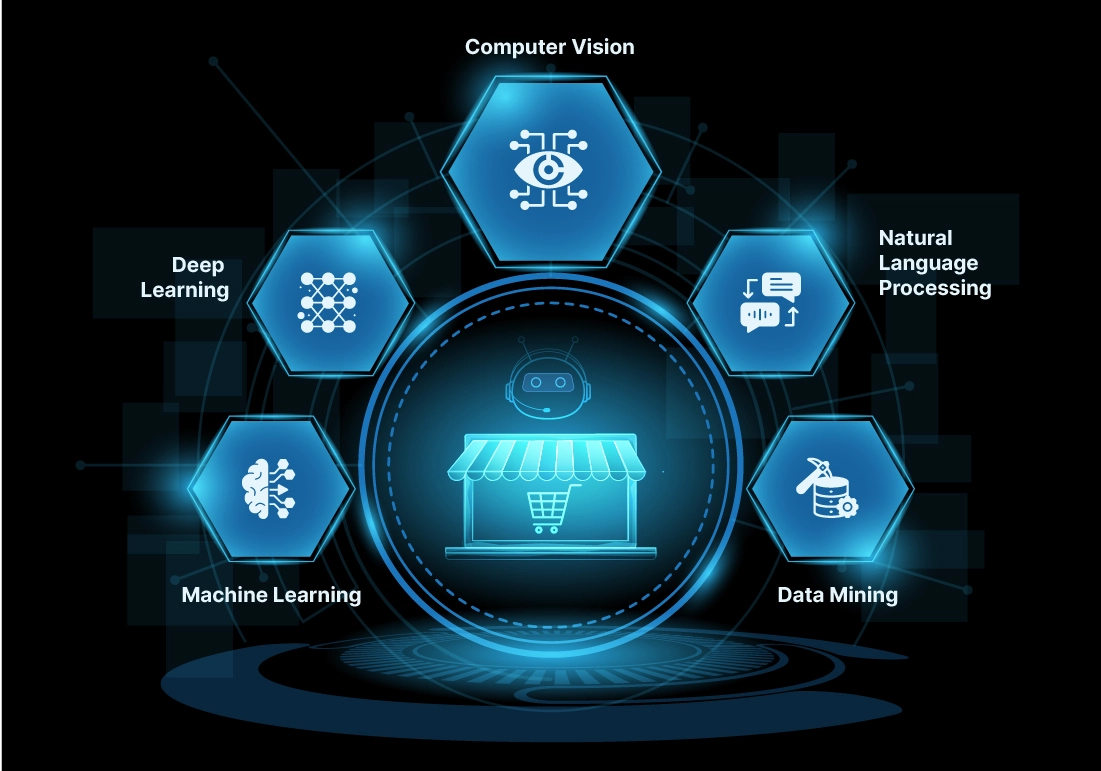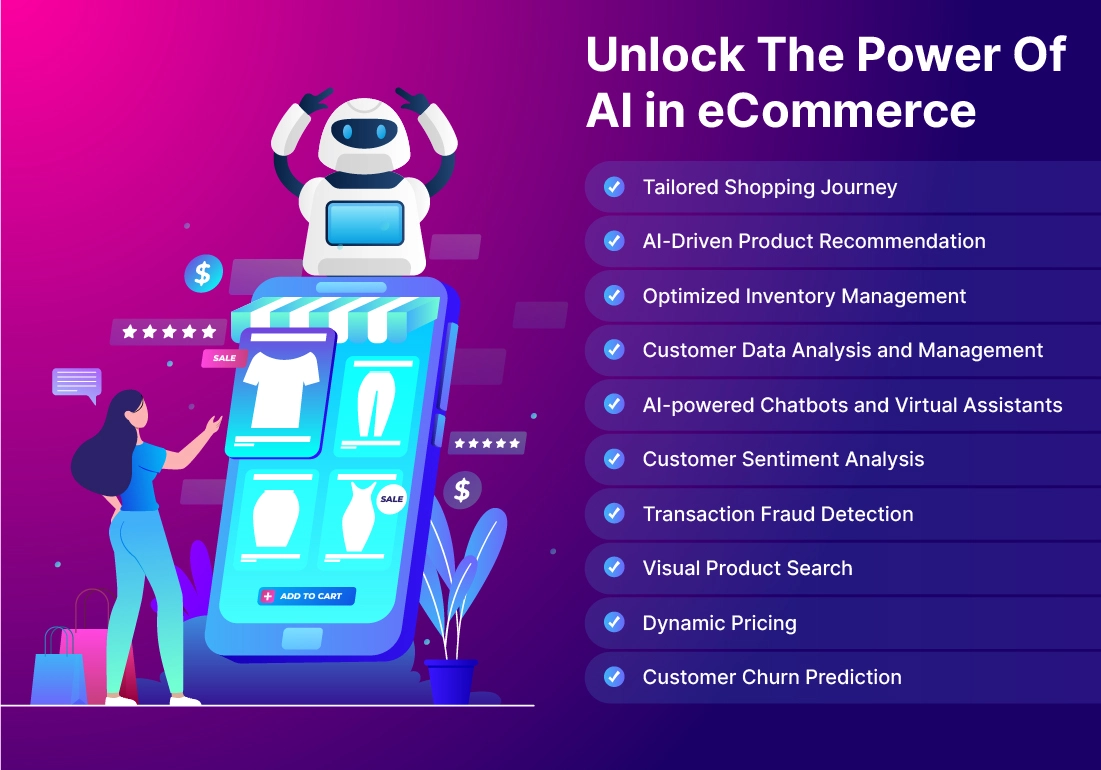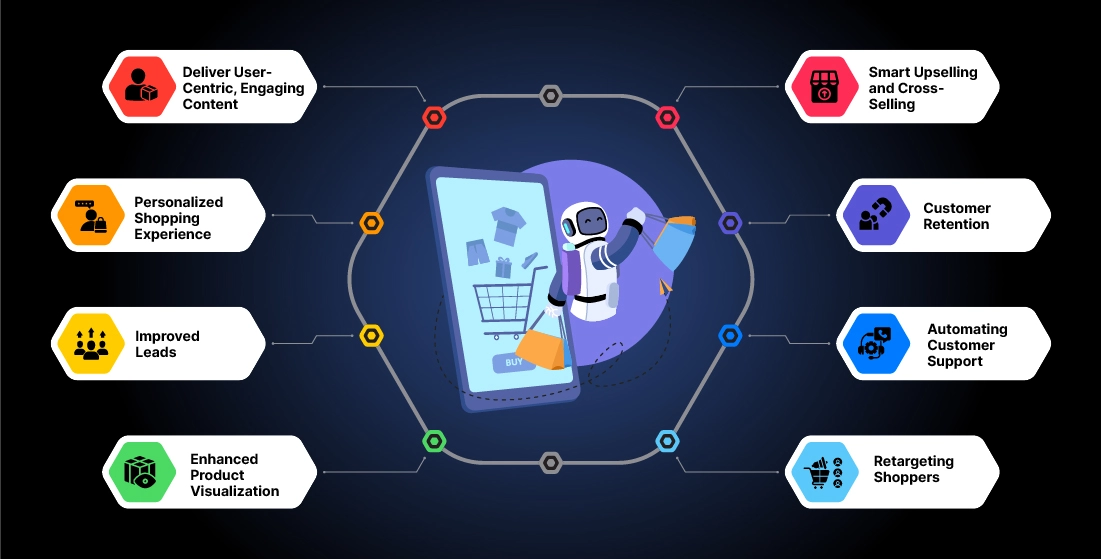Artificial Intelligence (AI) is making industries more innovative and intelligent, and eCommerce is among the early adopters of AI. Dive into the blog post to discover how using AI in eCommerce transforms how online shopping stores connect with customers. Explore different AI technologies empowering eCommerce businesses to enhance customer experience, its diverse use cases, benefits of AI integration, and the best AI tools for eCommerce success.
Table of Contents
Artificial Intelligence - A Game-Changer for eCommerce Businesses
Imagine a scenario where your online store is smart enough to anticipate the needs and preferences of customers and offer a highly personalized shopping experience, just like they would get from an attentive salesperson when visiting a physical store. Well, with the adoption of Artificial Intelligence in e-commerce businesses, offering the same level of personalized assistance to online shoppers has become a reality. A staggering 28% of top-tier companies have already been leveraging the potential of AI in eCommerce to streamline their processes, automate customer services, and enhance online shopping experiences.
AI Adoption in E-commerce
Followed by Fintech and Media, eCommerce is probably the third-highest industry sector in AI adoption. AI adoption in eCommerce has increased tremendously in the last five years and is expected to grow more in the coming years. A recent study shows that 84% of eCommerce businesses are either actively integrating AI solutions or prioritizing them for the future. Besides, around 80% of retail executives are expected to take advantage of AI in e-commerce to facilitate automation in their business by 2025.
Here are some of the interesting facts that will enhance the importance and ongoing trend of integrating Artificial Intelligence in eCommerce,
- Voice Commerce on the Rise: 22% of users prefer voice assistants for interactions, highlighting a growing trend in voice commerce.
- AI Makes Shopping Easier: 26% of respondents find AI voice assistants simplify their shopping experience by making other features more accessible.
- E-commerce AI Market Booming: The global AI market in e-commerce is expected to surge from $5.81 billion in 2022 to a staggering $22.60 billion by 2032.
Types of AI Technologies For eCommerce That Drives Customer Engagement
In the fast-paced eCommerce landscape, providing a personalized shopping experience is no longer a luxury; it’s a necessity. Whether browsing, shopping, product search, or inquiries, customers expect a tailored approach that makes them feel special. Hence, it is becoming vital for businesses to leverage cutting-edge AI technologies to meet evolving customer expectations and deliver a new level of personalization. Let’s shed some light on different types of AI technologies ecommerce businesses use to enhance the online shopping experience and personalize the customer journey.

Machine Learning
Employing Machine Learning (ML) algorithms helps eCommerce businesses analyze vast customer data, identify patterns, evaluate user preferences, and offer personalized product recommendations. Machine learning is the backbone of intelligent eCommerce operations as it enables forecasting sales trends, anticipating customer demands, and automating logistics, allowing businesses to provide a seamless online shopping experience.
Computer Vision
As most say, a picture is worth a thousand words, but it’s worth even more in eCommerce. Computer vision technology allows machines to interpret and analyze visual images and videos. eCommerce companies utilize this AI technology for product tagging, intelligent visual search, and virtual try-on experience. With computer vision, online stores can use AI for eCommerce personalization, allowing customers to visualize how a product would actually appear before purchasing it.
Deep Learning
With the implementation of deep learning technology, eCommerce businesses excel at processing vast amounts of structured and unstructured data, including images, videos, audio, documents, and other texts. Deep learning models help extract meaningful insights, recommend tailored products, recognize images for product tagging, and filter out fake profiles and purchases.
Natural Language Processing
Natural Language Processing (NLP) allows eCommerce systems to understand and respond to customer queries in a human-like language. By integrating NLP technology, eCommerce businesses enhance their chatbots, virtual assistants, or text-based search engines. NLP algorithms enable analyzing customer sentiment, responding to FAQs and product inquiries, and offering personalized assistance based on user needs. Using NLP-based solutions is perfect for delivering engaging and interactive shopping experiences.
Data Mining
Whether small or large, eCommerce companies often deal with abundant data. Incorporating data mining techniques and AI in eCommerce platforms, businesses can efficiently gather, analyze, and process massive datasets to extract valuable insights. AI-powered data-driven insights help business owners make informed decisions by accurately analyzing customer demographics, browsing history, purchasing behavior, and emerging trends.
Traditional eCommerce vs AI-Powered eCommerce
Both traditional and AI-powered ecommerce have crucial differences, which we have discussed below.
|
Traditional eCommerce |
AI-powered eCommerce |
| Processes |
Manual processes |
Automated |
| Personalization |
Limited |
Customized as per users’ expectations |
Decision-Making |
Reactive approach |
Proactive approach |
Customer Experience |
Basic |
Tailored |
Data Analysis |
Limited |
Advanced |
10 Practical Use Cases of AI in eCommerce
Now that we have explored diverse AI technologies that can help eCommerce businesses scale their platforms and operations, it is time to explore some practical AI applications in eCommerce. From offering customers the right products at the right time to enabling smart product search, let us explore various AI use cases in eCommerce businesses.

By integrating solutions powered by AI in e-commerce platforms, businesses can efficiently customize shopping experiences. Make your customers feel special as they browse through your online store, getting personalized suggestions and assistance that perfectly aligns with their desires, preferences, and tastes. From informing customers about special offers to guiding them through complimentary items, the blend of AI and eCommerce systems can help increase conversions by keeping the users engaged and satisfied.
Real-Life Example: Sephora adopted AI to offer virtual makeup try-ons, providing personalized recommendations based on skin tone, facial features, and desired look.
AI-Driven Product Recommendation
AI-driven product recommendation engines analyze large amounts of customer data, including customers’ browsing history, purchasing patterns, user behavior, and demographic information, to offer personalized product suggestions. Utilizing AI’s advanced algorithms and systems, eCommerce businesses can offer relevant products smartly, boosting overall customer satisfaction and conversion rate.
Real-World Example: Amazon’s recommendation engine is legendary. It suggests products based on purchase history, browsing behavior, and even items in your cart.
Optimized Inventory Management
As you may know, inventory management is crucial for any ecommerce business to drive efficiency and success. Integrating AI in eCommerce allows enterprises to analyze historical sales data, evaluate market trends, predict customer demands, and optimize stock levels. AI models help ensure the proper inventory levels are maintained while minimizing storage costs.
Real-Life Example: Walmart employs AI to predict demand, optimize inventory levels, and reduce stockouts.
Customer Data Analysis and Management
Data is the lifeblood of eCommerce, and with the advanced analysis capabilities of AI, eCommerce businesses can efficiently gather, analyze, and process a large amount of customer data to extract valuable insights. AI-driven insights into customer behavior, preferences, buying patterns, and market trends allow business owners to make informed decisions and drive business growth.
Real-Life Example: Starbucks collects and analyzes customer data to personalize offers and rewards, fostering loyalty.
AI-powered Chatbots and Virtual Assistants
AI-powered chatbots and virtual assistants have taken the eCommerce industry by storm, handling more than 70 percent of customer interactions and queries for retailers. As per recent reports, the global chatbot market is expected to grow around USD 1.25 billion by 2025. From product inquiries to order tracking, AI virtual assistants can handle multiple queries simultaneously, facilitating 24/7 personalized assistance to shoppers.
Real-World Example: H&M employs chatbots to answer customer queries, provide product recommendations, and even assist with returns.
Customer Sentiment Analysis
Keeping customers’ thoughts about your eCommerce products and services is essential to build brand trust, reputation, and loyalty. With AI-driven sentiment analysis, businesses can gain invaluable insights into customer opinions and sentiments. With advanced eCommerce AI solutions, it becomes feasible to analyze customer reviews, social media interactions, and product reviews/feedback to evaluate customer satisfaction levels and pinpoint improvement areas for your eCommerce business.
Real-Life Example: Apple tracks online sentiment to respond to customer concerns and maintain a positive brand image.
Transaction Fraud Detection
Cybersecurity is the primary concern for every eCommerce business due to the consistent rise in fraudulent activities. Thankfully, AI-powered fraud detection systems can help analyze vast amounts of transaction data to identify anomalies, suspicious behavior, transaction patterns, unusual purchases, and other indicators to prevent fraudulent activities. Moreover, leveraging the combined power of ML and AI in payments helps ensure fast, secure, and seamless transactions.
Real-Life Example: Shopify leverages AI to identify and prevent fraudulent activities on its platform
Visual Product Search
Enhance your customers’ online shopping experience by adapting AI-based visual product search in your eCommerce stores. By integrating next-gen AI technologies like Computer Vision and Deep Learning into your eCommerce platform, you can allow your customers to search for products by uploading an image or directly scanning the product. This enables customers to find products effortlessly, reducing search friction and making their shopping experience more intuitive.
Real-Life Example: Google Lens: Uses image recognition to identify products and provide relevant information.
Dynamic Pricing
Staying competitive in the rapidly changing eCommerce market requires businesses to employ dynamic pricing strategies. By adopting AI in eCommerce, you can enable intelligent suggestions to optimize your pricing strategies based on the AI model’s analysis of market trends, competitor pricing, customer demands, and real-time user behavior.
For example, Winter is coming, and your stock of summer hiking boots needs to be cleared to make space for new winter gear. In such an instance, AI models will recommend reducing the price of summer hiking boots to increase sales and avoid holding dead stocks.
Real-Life Example: Amazon adjusts prices in real-time based on factors like demand, competition, and time of day.
Customer Churn Prediction
Every customer must be offered high-quality products that align with their expectations and needs. Failing to do so increases the chance of losing customers, which can be costly for any eCommerce company. However, with AI’s predictive analytics capabilities, it is feasible to anticipate customer churn by analyzing their engagement levels, browsing history, and purchase frequency. AI solutions help eCommerce businesses identify customers at risk of churning and implement targeted retention strategies to win them back before it’s too late.
Real-life Example: Subscription-based services: Employ AI to predict customer behavior and tailor retention strategies accordingly.
Don’t Miss Out on the AI Advantage
Unleash the power of AI in your eCommerce store. Hire AI developers from Bacancy to upgrade your online store, bringing your AI vision to life.
Benefits of Integrating AI Solutions in eCommerce
Artificial Intelligence (AI) transforms online shopping experiences for eCommerce businesses, unlocking significant benefits for companies and customers. Here are some transformative advantages eCommerce businesses can get by adopting Artificial Intelligence in eCommerce.

Deliver User-Centric, Engaging Content
By implementing AI solutions into your eCommerce platform, online businesses can deliver engaging content that aligns with their customers’ tastes and preferences. From analyzing customer behavior, purchase history, and demographic information to creating dynamic product descriptions, AI solutions help ensure every interaction feels relevant and engaging.
AI makes it possible to create a personalized shopping experience for customers and analyze their unique needs, preferences, and interests to recommend the best-matched products. With AI-driven personalization, eCommerce stores can delight customers with specific products, promotions, or complimentary items, winning their trust and satisfaction.
Attract Leads Through Right Product Recommendations
By integrating AI-powered recommendation engines and virtual shopping assistants, eCommerce businesses can convert potential prospects into customers with intelligent product recommendations. AI solutions can serve attractive product suggestions to shoppers based on their preferences and tastes, encouraging them to explore new favorites they never knew existed.
Enhanced Product Visualization
Letting your customers completely visualize products online is a challenge for online commerce businesses, especially when it comes to visualizing oversized products. However, with the use of AI for eCommerce, businesses can provide interactive 3D models and virtual try-on experiences to customers so they can explore how the product looks or feels before making a purchase. Additionally, AI also helps create visually appealing images and interactive elements to enhance overall shopping experiences.
Smart Upselling and Cross-Selling
AI solutions go beyond offering personalized product recommendations; they also help identify opportunities for intelligent upselling and cross-selling. AI systems can analyze the buying habits of eCommerce consumers and accurately predict what they might shop for next. This allows online businesses to send tailored reminders, product suggestions, or special offers, resulting in more conversions. AI models can also help increase average order value and revenue by suggesting high-value items relevant to customers’ interests.
Customer Retention
One of the most significant benefits of integrating AI capabilities in eCommerce platforms is the increase in customer retention rates. AI algorithms help retain customers by continuously analyzing their interactions with your online products, predicting their needs, and offering personalized rewards to keep them returning for more.
Automating Customer Support
Don’t let your customers wait to get answers to their queries or assistance for specific tasks. As an AI automation agency, we leverage AI-driven chatbots and virtual assistants to help eCommerce businesses deliver instant, reliable, and 24/7 customer support. Whether your customers need help with sizing or want to track their orders, AI chatbots have them covered. Automating customer support can save time and resources so your support team can focus on other complex tasks.
Retargeting Shoppers
AI-powered retargeting or remarketing campaigns involve reminding or notifying potential customers who have shown interest in your products earlier but haven’t purchased them. With advanced AI algorithms, you can target your existing customers or individuals who left their buying journey incomplete with personalized emails or notifications that will likely capture their attention and encourage them to convert.
Drive Sales: Choose The Right AI Tools For Ecommerce Success
Having explored the undeniable benefits and transformative use cases of AI in eCommerce, you are probably wondering about implementing the power of this cutting-edge technology into your eCommerce business. With countless AI tools available in the market, it will be hectic and time-consuming to filter out and choose the right ones to integrate into your online shopping platform.
Cutting down the chase and saving you invaluable time, we have enlisted some popular AI tools to help you drive eCommerce sales and growth.
Octane AI – The best tool for Shopify online stores to enhance customer engagement through personalized quizzes and offer tailored product recommendations based on customer data analysis. Along with Shopify, Octane AI can also be integrated with Klaviyo, Attentive, Zapier, and more.
Synthesia – A perfect AI-driven video generation platform to create studio-quality, realistic videos with 60+ templates and 140+ AI avatars to select from. Deliver personalized marketing messages by generating captivating videos in more than 120 languages and accents available to attract customers globally.
OptiMonk AI – This AI-powered CRO platform enables automated A/B testing and product page optimization. It helps enhance customer engagement and optimize the website layout and messages to maximize the conversion rate of your eCommerce business.
SearchIQ – An AI-powered search and discovery platform that helps optimize on-site search functionality, showcase relevant search results, and offer personalized recommendations. SearchIQ improves user experience and increases sales conversion rates by enhancing the search functionality.
Landbot – enables building user-friendly, conversational chatbots that provide 24/7 assistance, schedule appointments, streamline processes, generate more leads, and deliver personalized experiences.
Clerk.io – A powerful AI tool for personalization and product recommendation, 1:1 email marketing, and customer segmentation. Its intelligent search engines deliver the most relevant results based on search queries, keywords, and user behavior.
Powtoon – Powtoon’s AI Avatar Generator lets users create customized avatars for videos and presentations. With AI-driven technology, it generates avatars that reflect various styles, appearances, and emotions, making it easy to add personalized visual elements to multimedia projects.
PixelCut – is an AI-powered online platform that allows users to create and edit product photos with a single click. It offers a suite of AI-driven tools, such as Background Remover, Magic Eraser, and Image Upscaler, making the editing process ten times faster and more efficient.
Conclusion
Adopting AI eCommerce has significantly transformed how businesses interact with customers and deliver shopping experiences. As explored in the blog post, from enabling personalized product recommendations and automated customer support to enhancing product visualization and customer retention, the transformative impact of AI in the eCommerce industry is undeniable.
However, seamless integration of AI tools and solutions into your existing systems to obtain the numerous benefits AI implementation offers can be daunting. Seeking expert guidance from an AI development company can help ventures build tailored eCommerce AI solutions to address their specific requirements and ensure a smooth implementation process. Unlock the new era of personalized shopping experience and embrace the power of Artificial Intelligence in eCommerce to thrive in today’s competitive landscape.
Frequently Asked Questions (FAQs)
eCommerce businesses leverage AI technologies to personalize customer experiences, optimize operations, and drive growth. Some of the commonly used AI technologies include Natural Language Processing (NLP), Machine Learning (ML), Computer Vision, Data Mining, Robotic Process Automation (RPA), and Generative AI in eCommerce. Being a leading AI development company, our experts hold immense expertise in these next-gen technologies, helping our eCommerce clients improve online shopping, enhance product visualizations, and automate customer support.
There are numerous ways in which Artificial Intelligence (AI) can help transform eCommerce businesses. Here are a few benefits of using AI in eCommerce businesses:
- Personalized Shopping Experiences
- Automated Customer Support
- Enhanced Inventory Management
- Data-driven Decision Making
- Customer Retention Strategies
- Strategic Upselling and Cross-Selling
- Streamlined Operations
At Bacancy, we have a talented pool of AI engineers who can seamlessly integrate AI into your eCommerce platforms. We build AI solutions that are modular, scalable, and adaptable, allowing businesses to automate their business operations, streamline various processes, and personalize shopping experiences.







